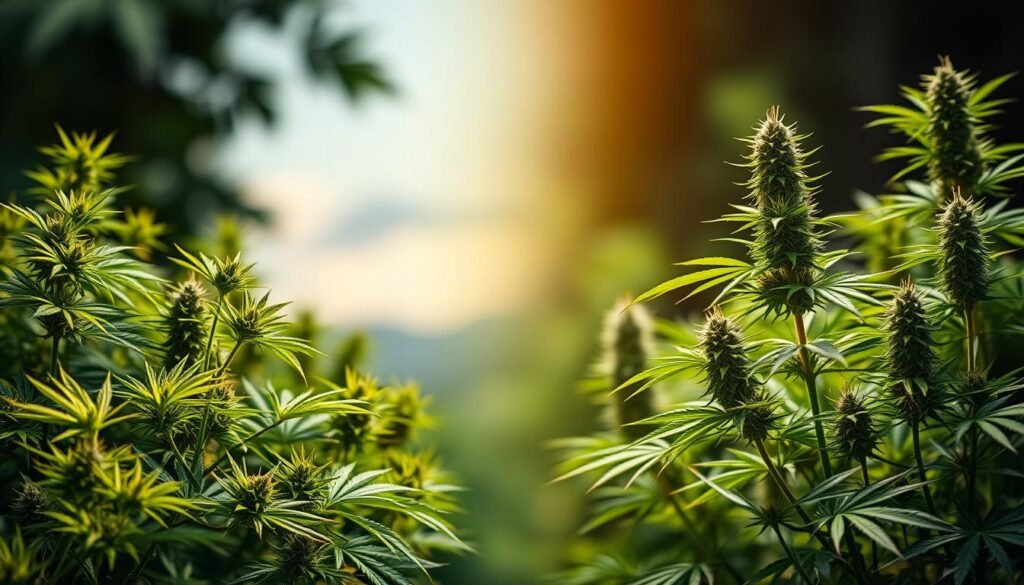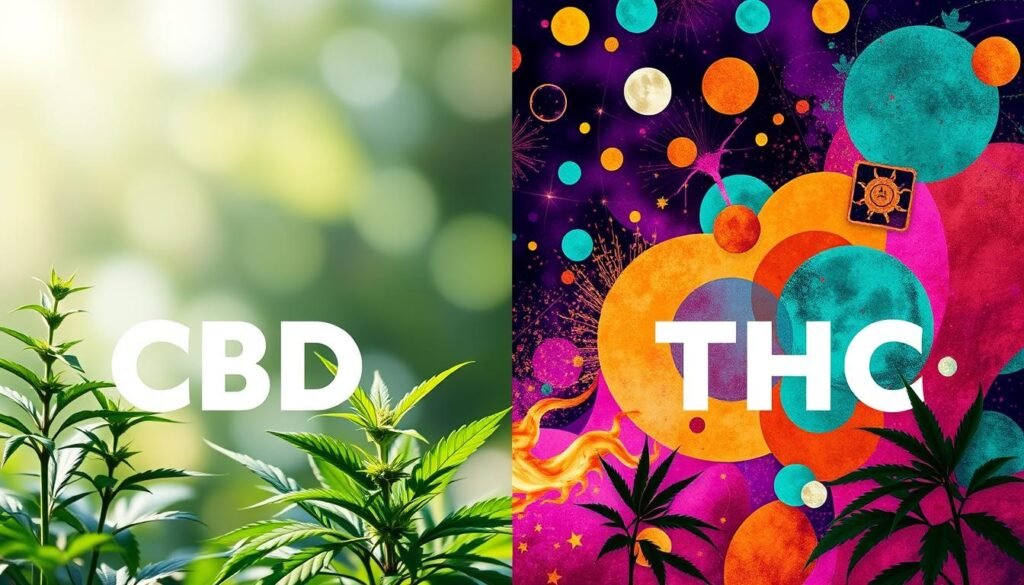One in five U.S. adults struggles with anxiety, the most common mental disorder in the nation. Many are now looking at CBD (cannabidiol) and THC (tetrahydrocannabinol) from cannabis for help. This is part of a larger movement towards natural solutions for anxiety, sparking research into CBD and THC benefits.
A study with 300 people tested CBD and THC for anxiety relief. Everyone saw some anxiety decrease. Yet, those using CBD had the biggest improvements. The THC group saw less impact. We’ll explore how CBD and THC can help manage anxiety symptoms.
Key Takeaways
- One in five U.S. adults deals with anxiety disorders.
- Research suggests CBD is more effective than THC for anxiety reduction.
- The THC-dominant group in studies showed less improvement in anxiety relief.
- More research is needed to fully understand the effects of these cannabinoids.
- Cannabis use presents both potential benefits and risks for anxiety sufferers.
Understanding Cannabinoids
Cannabinoids are active components found in cannabis. They play a key role in how our bodies respond to cannabis sativa strains. They interact with the endocannabinoid system, affecting mood, pain, and anxiety. Knowing how cannabinoids work helps people make better choices about using them, especially for anxiety relief.
What are Cannabinoids?
Cannabinoids are chemicals that connect to receptors in our bodies, affecting many functions. The most researched cannabinoids are THC and CBD. THC is known for causing a “high,” while CBD is popular for its healing effects without intoxication. Different cannabis strains have various levels of THC and CBD, leading to unique effects for the user.
Key Differences Between CBD and THC
THC and CBD have different effects. THC makes you feel euphoric, but CBD doesn’t make you high. This makes CBD a good choice for those looking for relief without the psychoactive effects. Studies show CBD may cut anxiety by up to 50% in the young.
For some, products with both THC and CBD offer better benefits. This is known as the entourage effect. It might boost the healing properties.
Legal Status in the United States
The laws around cannabis and its products change a lot by state. As of April 2023, hemp-based CBD is okay federally if it’s under 0.3% THC. But, THC’s legal status is more complex. About 38 states allow it for medical use, and 24 for recreation. These different rules can make it hard to get and use cannabinoid products consistently, especially for treating anxiety.
Cannabidiol (CBD) and Its Effects
Cannabidiol, known as CBD, is making waves for its healing powers. It comes mainly from hemp. Over a hundred compounds are found in cannabis, and CBD is one of them. This part explains what makes CBD special. It doesn’t get you high but can help with anxiety.
Basics of CBD
CBD is famous for its non-psychoactive properties. It doesn’t cause the buzz THC does. People prefer it for relief without altering their mind. CBD affects the body’s endocannabinoid system but in a gentle way. It helps you feel calm and relaxed.
Non-Psychoactive Properties of CBD
THC affects the brain and sometimes causes anxiety. CBD is different. It doesn’t make your thinking fuzzy. This means you can handle anxiety better without getting scared or paranoid.
Potential Medical Benefits of CBD for Anxiety
Recent studies show CBD’s promise for anxiety relief. It appears to lessen anxiety in nerve-racking scenarios. Users say CBD helps with panic attacks. This shows its healing potential. The demand for CBD products is rising. People recognize the hemp-derived CBD benefits. CBD is becoming a key way to fight anxiety and boost mental health.
Tetrahydrocannabinol (THC) and Its Psychoactive Effects
Tetrahydrocannabinol, or THC, is the main psychoactive compound in cannabis. It causes the “high” many associate with marijuana. Understanding how THC works is key, especially regarding its use in treating anxiety with medical marijuana.
What is THC?
THC is among over 100 cannabinoids found in marijuana. Unlike CBD, THC has psychoactive effects. It binds with brain receptors, affecting mood, appetite, and pain. These receptors are part of the endocannabinoid system.
How THC Affects the Brain
Upon consumption, THC quickly enters the bloodstream and then the brain. There, it interacts with CB1 receptors. This leads to the psychoactive effects, such as altered perception and mood changes. Studies show the potency of cannabis has increased from about 4% THC in 1995 to 12% in 2014. This rise in potency may increase the risk of negative effects, especially in young people.
THC and Anxiety: The Paradox
The link between THC and anxiety is complex. For some, low doses may reduce anxiety, offering stress relief. On the contrary, high doses might heighten anxiety, paranoia, or psychosis. This is especially true for teens. This paradox underlines the need for careful dosing and understanding individual tolerances in medical uses.
CBD vs THC Anxiety: Research Insights
Studies have looked into how CBD and THC affect anxiety. They offer clues about their potential upsides and downsides for those suffering. These research efforts reveal which compound might help more with anxiety.
Comparative Studies on CBD and THC for Anxiety Relief
Research points to CBD being better than THC at easing anxiety. People taking CBD in studies felt less anxious. CBD works differently in our bodies than THC, possibly reducing anxiety and improving well-being. Meanwhile, THC’s effects can actually make some feel more anxious. Data clearly shows a preference for CBD when it comes to safety and reducing anxiety.
Potential Risks of THC for Anxiety Sufferers
THC might help somewhat, but it has risks for those with anxiety. High doses of THC are linked to more anxiety and panic attacks. This creates a debate among doctors about THC’s role in anxiety treatment. Using THC early on might lead to substance use issues later, especially in young people. Side effects like nausea and dry mouth also pose problems for THC in treating anxiety.

Exploring Cannabinoid Effects on Anxiety
Cannabinoids, especially CBD and THC, are in the spotlight for their effects on anxiety. Understanding these effects is key for those looking for relief through marijuana. CBD is known for its potential to ease anxiety, while THC’s relationship with mood and anxiety is more complex.
Effects of CBD on Anxiety Disorders
CBD is praised for its possible role in treating anxiety disorders. It may interact with our body’s endocannabinoid system, which helps regulate mood and anxiety. Though findings vary, some research supports CBD’s ability to reduce anxiety in controlled environments. For example, people with social anxiety have shown improvement with CBD in lab settings. This supports the idea that CBD could help ease anxiety symptoms.
How THC Impacts Mood and Anxiety
THC’s impact on anxiety can be strong and sometimes contradictory. It might reduce anxiety at first, but higher doses can worsen symptoms, particularly for new users. THC can increase anxiety for some. Yet, when combined with CBD, THC’s anxiety-increasing effects may lessen according to some studies.
Recent studies show that anxiety can increase with THC dose. One study noted rising anxiety in users with higher THC levels. Women felt these increases more than men, highlighting how treatments might need to vary.
| Study Type | THC Dose | Anxiety Rating | Participant Group |
|---|---|---|---|
| Vaporized/Smoked | 0mg, 10mg, 25mg | Increased | Minimal Cannabis Use |
| Intravenous | Higher Dose | Significantly Increased | Healthy Adults |
| Oral Administration | 15mg | Significantly Increased | Occasional Users |
In summary, CBD and THC affect anxiety in different ways. Learning about these differences can help find better anxiety treatments. As research grows, we get closer to finding the right balance between CBD and THC for anxiety relief.
Dosage and Consumption Methods
Knowing how much CBD and THC to use is key for those wanting to ease anxiety. Everyone reacts differently to these substances, based on things like body type, anxiety levels, and health. Learning about how much to take and the ways to take it helps you get the most out of CBD and THC, while staying safe.
Effective Dosing Strategies for CBD
For anxiety, starting with a small dose of CBD is smart, especially for first-timers. You can slowly up your dose, watching how you react and how you feel. Studies have shown CBD can help with anxiety, even in small amounts. It’s usually best to start with 5 mg to 10 mg a day and adjust from there. When trying CBD, you should:
- Consult a healthcare professional for personal advice.
- Monitor responses and use a journal to note what works.
- Choose quality CBD products that list ingredients clearly.
How to Use THC Safely for Anxiety
THC can help some with anxiety, but it might make things worse for others, especially in high doses. To use THC without problems, start with tiny amounts like 2.5 mg to 5 mg. See how you feel. It’s key to find just the right amount for you. Tips for using THC include:
- Choosing products with equal THC and CBD to avoid more anxiety.
- Trying different ways to take it, like oils, edibles, or vaping, to see what’s best.
- Not using THC if you’re already feeling very anxious or might get a panic attack.
It’s also important to know the laws about THC, which differ by state. As of May 2024, 24 states plus Washington, D.C., have made recreational marijuana legal. Knowing your local laws helps you use THC without getting into trouble. There’s ongoing research into CBD and THC, showing they have potential benefits but also risks. For deeper insights on dosages for anxiety relief, check reputable research sources.

| Cannabinoid | Ideal Starting Dosage | Consumption Methods | Considerations |
|---|---|---|---|
| CBD | 5 mg – 10 mg daily | Oils, tinctures, edibles, beverages | Monitor response; consult professionals |
| THC | 2.5 mg – 5 mg daily | Oils, edibles, vaping | Start low; consider CBD ratios |
Popular Cannabis Strains for Anxiety Relief
Finding the right cannabis strain is crucial for those looking to ease anxiety. Knowing the difference between cannabis sativa strains and Indica strains helps pick the best one. This choice plays a big part in managing anxiety symptoms.
Cannabis Sativa Strains vs Indica Strains
Sativa and Indica are the two main types of cannabis strains. Sativas lift your mood and give you energy, helping reduce anxiety for some. Indicas, on the other hand, calm and relax you, often preferred for night use or when you need to unwind.
Specific Strains Known for Reducing Anxiety
Several strains are famous for their ability to help with marijuana anxiety relief. Here’s a look at some key ones, including their CBD and THC levels:
| Strain | Type | CBD Content | THC Content |
|---|---|---|---|
| ACDC | Hybrid | 14% | Less than 1% |
| Harle-Tsu | Hybrid | 21.05% | 0.86% |
| Sour Tsunami | Sativa | CBD:THC Ratio 13:1 | Less than 1% |
| Cherry Wine | Hybrid | 17% | Less than 1% |
| Ringo’s Gift | Hybrid | 20:1 | Less than 1% |
| Blue Dream | Sativa | Unknown | 19% |
| Granddaddy Purple | Indica | Unknown | 27% |
| Suzy Q | Hybrid | 11% | Little THC |
Each cannabis sativa strain has unique effects. For example, Blue Dream and Sour Diesel offer positivity while calming the mind. Meanwhile, Granddaddy Purple aids in deeper relaxation, ideal for nighttime.
Before using, think about how THC and CBD affect you. Some might feel more anxious with THC. Learning about how CBD affects mood and choosing the right strain is important. You can find more info on choosing the right strain for your needs here.
The Endocannabinoid System and Anxiety
The endocannabinoid system is key in managing how we feel and respond to stress. It works to keep our emotions and reactions in balance. This includes managing anxiety disorders, which many people around the world face. Learning about this system’s role in fear and anxiety helps us see how CBD and THC might aid in treating anxiety.
Understanding the Role of the Endocannabinoid System
The endocannabinoid system helps control our fear and anxiety. It does this through parts of our nervous system. It has two main receptors, CB1R and CB2R, and natural compounds like anandamide and 2-AG. Together, they manage how neurotransmitters are released, affecting our emotions and how we handle stress.
How Cannabinoids Interact with the Endocannabinoid System
CBD and THC work with the endocannabinoid system to ease anxiety symptoms. They affect serotonin and dopamine, important for our mood. When this system doesn’t work well, we may feel more anxious, especially with ongoing stress. Enhancing this system’s function could relieve anxiety, research shows.
Research into the endocannabinoid system and anxiety is ongoing. Early studies hint that genetic changes and new drug strategies might improve treatments. As our knowledge increases, so does the possibility of using cannabinoid-based treatments for anxiety disorders.
Alternatives to Cannabis for Anxiety Relief
Nearly 20% of adults in the United States deal with anxiety. This shows the need for good ways to treat it. While some turn to medical marijuana, there are also other options. These alternatives range from prescription drugs to natural remedies.
Prescription Medications for Anxiety
Doctors often start with prescription meds for anxiety. These include:
- Selective Serotonin Reuptake Inhibitors (SSRIs)
- Benzodiazepines
- Buspirone
- Beta-blockers
Each type of medicine has its pros and cons. SSRIs, for example, generally take time to work. On the flip side, benzodiazepines act fast but might lead to addiction or withdrawal. It’s vital to work with a healthcare provider to find what’s best for you.
Non-Medical Approaches to Managing Anxiety
There are also non-medical ways to tackle anxiety. These include:
- Talk therapy, like cognitive-behavioral therapy (CBT)
- Mindfulness and meditation
- Regular exercise that boosts mood
- Enough sleep and a healthy diet
- Yoga, acupuncture, and music therapy
Using these strategies can help deal with anxiety without needing cannabis. Techniques such as the 4-7-8 breathing method also offer quick stress relief.
Keeping up with current research is important. It’s vital to compare medical marijuana with traditional treatments. If you struggle with anxiety, explore all options. Make sure your choice fits your health needs. For more on CBD products for anxiety, see more here.
| Treatment Type | Effectiveness | Risks |
|---|---|---|
| Prescription Medications | Varies by individual response | Dependency, withdrawal, side effects |
| Talk Therapy | High effectiveness for many | Time-consuming; requires commitment |
| Holistic Approaches | Benefits may vary | May require lifestyle changes |
Potential Side Effects of CBD and THC
It’s crucial to know the side effects of CBD and THC. These compounds help with anxiety but have risks. Knowing about CBD’s common side effects, THC’s risks, and long-term use is important for safety.
Common Side Effects of CBD
CBD is mostly safe but has some side effects. People might get:
- Dry mouth
- Diarrhea
- Reduced appetite
- Drowsiness
- Fatigue
Research shows 25% of online CBD products had less CBD than claimed. This questions product trust. The FDA has only approved Epidiolex, a CBD oil for certain epilepsy types. CBD can also affect how other medicines work, especially blood thinners. It’s key to tell doctors about any CBD use.
Risks Associated with THC Consumption
THC, cannabis’s psychoactive part, has different risks. Small doses may help with anxiety, but more can cause:
- Elevated heart rate
- Racing thoughts
- Mood changes
- Paranoia and hallucinations
- Concentration problems
- Increased anxiety symptoms
Some find it hard to use THC medically without misusing it. This can lead to addiction. Long-term THC can make sleeping hard and lower motivation.
Long-Term Implications of Regular Use
Using cannabinoids for a long time has serious risks. Smoking or vaping cannabis can irritate the lungs and increase cancer risk. Vaping can cause severe lung injuries. Regular THC use may make anxiety worse and lead to dependency. While it may help with anxiety, it’s wise to use CBD with care. Start with low doses from trusted shops.

| Substance | Common Side Effects | Risks of Overuse |
|---|---|---|
| CBD | Dry mouth, diarrhea, fatigue | Interactions with medications |
| THC | Increased heart rate, mood changes | Dependence, increased anxiety symptoms |
Conclusion
In looking at CBD vs. THC for anxiety, it’s key to know how each one works. Studies show CBD might help anxiety quickly. A study with 300 people found those using CBD felt much better.
However, THC and CBD work differently on anxiety. High doses of THC can make anxiety worse, unlike CBD’s calming effects. Knowing this helps us use them wisely. It also shows we need more studies.
With more research, we’ll learn the best ways to use CBD and THC for anxiety. Being informed and careful is important for good mental health choices. This will help people make better decisions for their well-being.